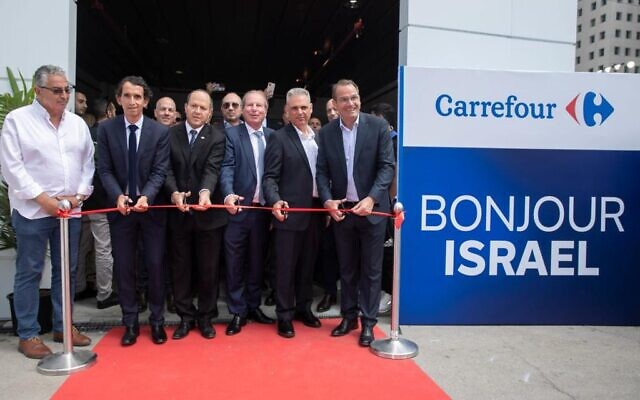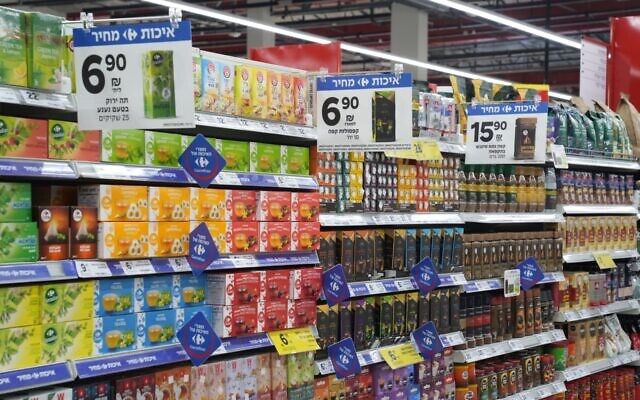French retail chain Carrefour opens 50 stores across Israel, vowing to disrupt prices
Basket of goods of Carrefour-branded goods is 60% cheaper versus basket of comparable goods by local competitors, according to retailer; analyst sees prices continuing to rise
Sharon Wrobel is a tech reporter for The Times of Israel.

French supermarket chain Carrefour on Tuesday opened its first 50 branches across Israel at an investment of NIS 250 million ($70 million), with observers hoping the move will spur much desired competition in Israel’s overly concentrated food retail market to help bring down the cost of living.
By the end of 2023, Carrefour expects to open a total of 80 to 100 branches. The launch comes after Israel’s Electra Consumer Products last year signed a franchise agreement with the French supermarket chain to set up 150 branches. Electra, which bought out the Yeinot Bitan supermarket chain in 2021, will convert the local supermarket branches to Carrefour stores as part of the deal. The franchise agreement is for 20 years, with an option for another 20 years after that.
Israel is Carrefour’s 50th country opening. The stores will operate under three brands, including Carrefour Hyper and Carrefour Market (larger discount branches) and Carrefour City (convenience branches) and will open in several cities throughout Israel, including Tel Aviv, Jerusalem, Beersheba, Or Akiva, Zichron Ya’acov, Ashdod, and Givatayim.
The branches will sell more than 1,000 Carrefour-branded products across 82 categories, including food products, organic products, toiletries and cleaning products at more competitive prices. A basket of Carrefour-branded products adding up to NIS 252.80 is around 60% cheaper than a basket of comparable products sold by local competitors, the French supermarket chain said.
“For the first time in history, an international retail chain, one of the world’s leaders, is entering the Israeli market,” said Carrefour Israel CEO Uri Kilstein. “We have made across-the-board price reductions on existing products, and Carrefour will be relatively cheap compared to competitors in the city, and cheaper outside the city in discount complexes.”
“We will continue to push forward and convert another 35-50 branches by the end of the year, and together we will build a strong and stable company here that will set the tone in the food retail market.”
In parallel with the opening of the 50 branches, a Carrefour online website was announced with the French retailer vowing to boost competitiveness in the retail delivery market and seeks to become a significant player.
“We are convinced that Carrefour Israel will provide a real solution to Israeli consumers and significantly improve their purchasing power,” said Patrick Lasfargues, president of Carrefour’s international division.
Food prices in Israel have risen 50% over the past two decades and are 25% to 80% above the OECD average, with dairy products, soft drinks, and grain-based products particularly expensive (as of 2017 data, according to the OECD). Some sectors in the local economy suffer from overconcentration, and in the food retail sector, the top three supermarket chains account for over half of the Israeli market, limiting competition and putting upward pressure on prices.
Meanwhile, import tariffs, regulatory bottlenecks, value-added tax costs and kosher restrictions have been keeping out international retail chains.
“We believe that Carrefour’s entrance into Israel by franchising agreement will raise the competitive landscape in the sector, which has been relatively low in the past few years,” Shira Achiaz, retail analyst at IBI Investment House told The Times of Israel. “The most important thing for the Israeli consumer is that the Carrefour entry is bringing in broad private label products that are cheaper than the leading brands operating in the same category in Israel.”
“This development is in our eyes an attractive value proposition, especially during these times of increasing prices and a worsening macroeconomic landscape,” said Achiaz.

At the same time, Achiaz cautioned that 2023 will be a challenging year for the food retail sector due to heightened competition and higher operating costs such as electricity, rent, and wages in a rising inflationary environment.
“Despite Carrefour’s entrance into Israel, we estimate that price increases will continue to accompany the sector, and may even strengthen,” said Achiaz. “Lately, suppliers and large importers have been announcing price increases in their goods such as milk and dairy products, due to higher operating costs and the rise in costs across the value chain.”
In early May, it was announced that regulated dairy products would see a rise of over 9% as part of an expected 16% total increase across three years. Dairy giant Tnuva this week raised the prices of its unregulated products by an average of 4.65%, with some products set to increase by over 9% mainly due to the increase in the price of raw milk.
Israel’s cost of living is one of the highest among countries in the OECD, which has been generally attributed to a lack of competition among local importers and manufacturers. Earlier this year, Finance Minister Bezalel Smotrich sought to lure US retail chain Costco Wholesale Corp. to make a foray into the Israeli market, wanting to fuel competition in the retail food market.
During a visit of the Carrefour Bet Shemesh branch on Monday, Prime Minister Benjamin Netanyahu hailed Carrefour’s launch as “gigantic news for the citizens of Israel regarding competition and the lowering of prices.”
Netanyahu touted Israel’s adoption of EU regulatory standards, meaning products won’t have to be re-approved in Israel, as one of moves easing Carrefour’s launch.
Facing increasing competition from the entry of Carrefour and 7-Eleven stores, which launched in Israel earlier this year, Shufersal, the country’s largest supermarket chain, in December inked a deal to set up a chain of stores in the country for the Dutch-owned international supermarket SPAR. As part of the deal, Shufersal will also sell SPAR products exclusively in its stores. The Dutch-owned chain has 13,600 stores and operates in 48 countries around the world.
Israel’s “retail chains have diverse growth drivers that will help them deal with the rise in competition, most notable of which are the expansions in areas related to traditional food retailing, store openings and the growth in business with institutional customers and in private label products at some chains,” said Achiaz.










